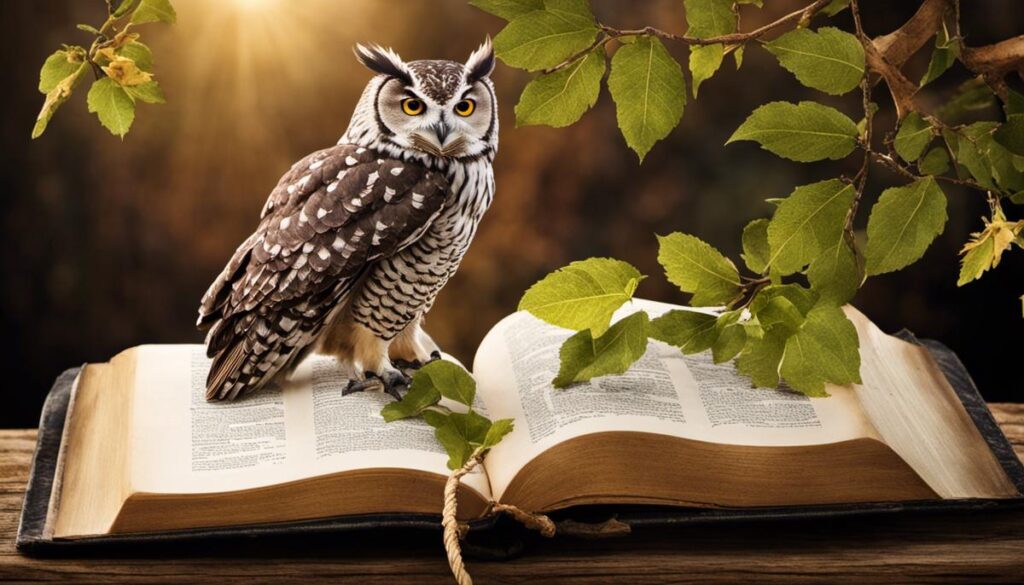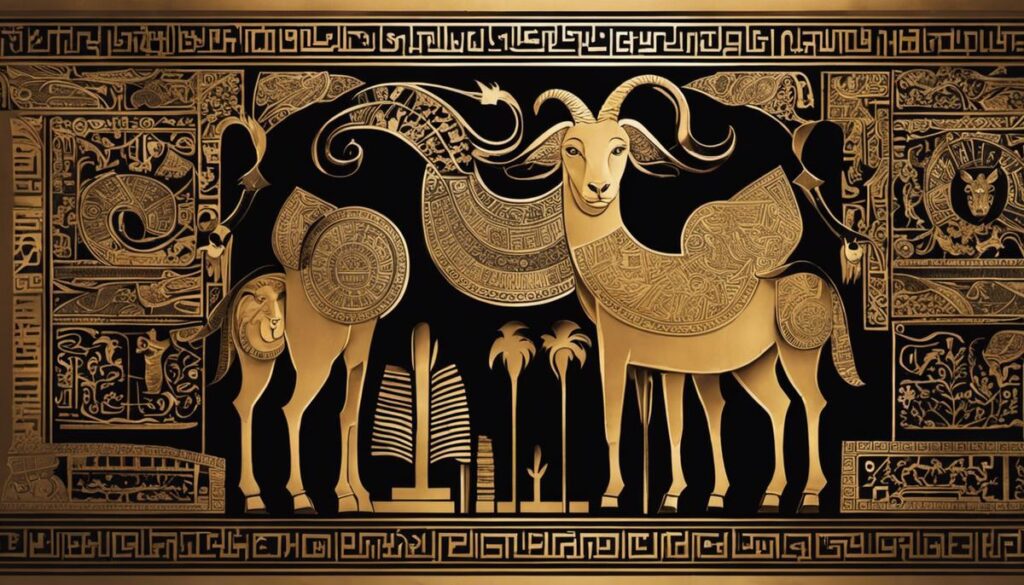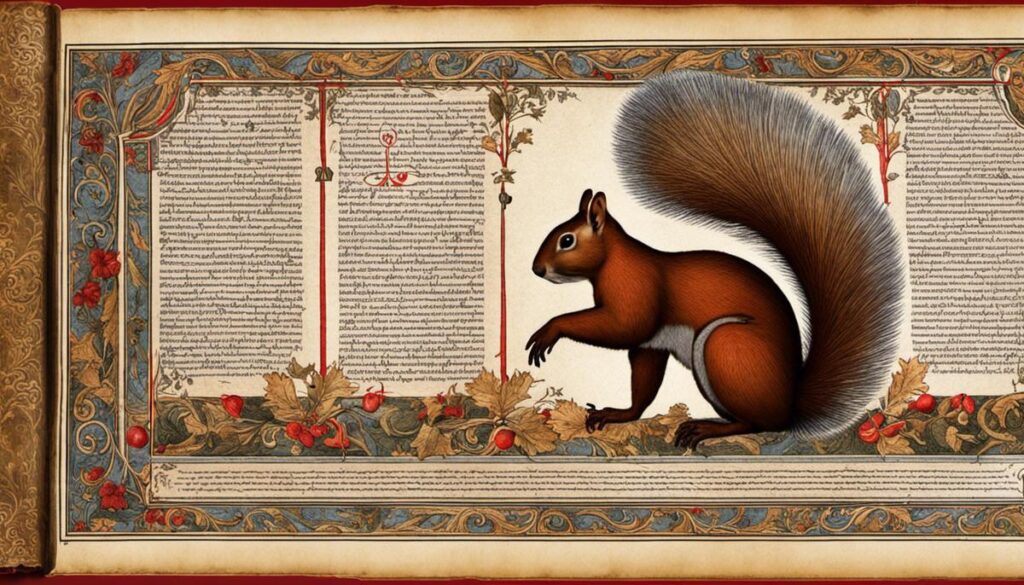The divine realm often communicates profound truths through parables, symbols, and even dreams, using elements like owls to convey profound mysteries. A creature that has universally piqued human curiosity and imagination, the owl holds a distinctive place in dream symbolism. From its Biblical portrayal to psychological interpretations, the owl often emerges as an emblem of wisdom, death, mystery, and transformation. This exploration dives into the rich tapestry of meanings associated with the owl, bridging the wisdom of ancients as depicted in the Bible with insights from modern psychology to enlighten the curious mind.
Biblical Interpretation of Owls
Owls in the Bible: An In-depth Examination of Biblical Symbolism
Regarded as symbols of wisdom, prophecy, and vigilance in numerous cultures, owls hold a distinct place in various mythologies; but their portrayal in the Bible diverges, painting a more complex and multi-dimensional image influenced by the socio-cultural setting of Biblical times.
Indeed, the various books of the Bible, the primary texts of Christianity, mention owls fourteen times spread across both it’s Old and New Testaments. However, their depiction primarily lays on negative symbolism, contrary to their perception in most modern Western societies.
Throughout the Old Testament, the owl is linked with desolation and abandonment. In the book of Isaiah (Isaiah 34:11,14,15) it is used to portray the utter desolation reserved for Edom as a result of its transgressions against Israel. A similar negative representation occurs in Jeremiah (Jeremiah 50:39), where an owl’s presence signifies the future destruction of Babylon.
In fact, the owl’s recurring symbolism as a creature of ruins, the desolate places, and the abyss link back to ancient Israel’s environment and wildlife. It is a creature that thrives in places shunned by humans, with their calls echoing in abandoned ruins and unforgiving wilderness – in effect, omnipresent metaphors of desolation.
Parallel to these ominous representations, the owl, categorized as a non-kosher creature in Leviticus (Leviticus 11:16) and Deuteronomy (Deuteronomy 14:15), symbolizes impurity within the Judaism-rooted regulations, again reinforcing the predominantly negative symbolism attributed to owls in the Bible.
The pairing of owls with the darkness of night in the Bible also feeds into this imagery, connected intrinsically to their biology and behavior, but charged with symbolic meaning in the ancient Judaic worldview. Their nocturnal nature was directly linked to the realm of spiritual darkness, and thus, various evils.
However, this treatment of owls in the Bible should not overshadow the complex symbolism and interpretations inherent in examining ancient texts. Given the absence of Hebrew ornithologists during Bible times and the likelihood of multiple species being referred to under the same generic term, some ambiguity exists in translating exact bird species, thus adding another layer of complexity to these interpretations.
Ultimately, the depiction of owls in the Bible serves as an intriguing reflection on the confluence of culture, religion, and natural history. Exploring biblical interpretations not only offer an insight into the religious texts, but also a holistic appreciation of the conditioned perceptions of wildlife in ancient societies.
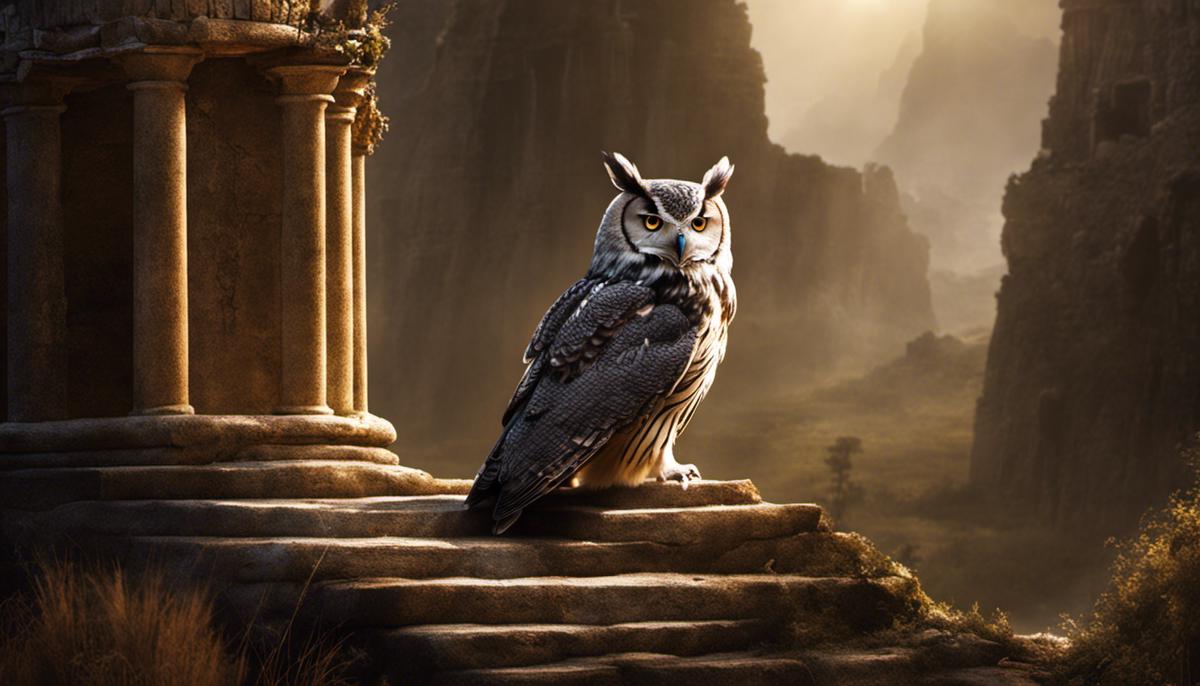
Owls in Dreams: General Interpretations
Owls in Dreams: Modern Ancient Psychological Interpretations
Owls, often depicted in various hues of symbolism, carry forward their rich contextual framework into the realm of dreams as perceived by modern psychological theories. These nocturnal birds, with their much-heralded historical and cultural significance, emerge in dreams with meaningful implications that frequently intersect with our subconscious, individual experiences, and psychological state.
An important figure in modern dream interpretation is Carl Jung, a renowned psychologist who postulated on the concept of archetype symbols in dreams. Owls, in the Jungian landscape, are indicative of an archetype called “The Shadow.” This symbol typically relates to the lesser known, often suppressed aspects of one’s personality. The presence of an owl might indicate an urgent need to explore hidden traits, urging the dreamer towards self-understanding and introspection.
Jung also spoke on “The Self,” a psychological concept dealing with the unification of an individual’s conscious and unconscious aspects. An owl appearing in dreams creates a pathway for the individual to acknowledge and confront their internal dichotomies, encouraging them to pursue wholeness and self-realization.
On the other spectrum of psychology, Sigmund Freud interpreted dreams through a psychoanalytic lens. By Freudian standards, an owl can signify repressed desires or instincts that have been buried within the subconscious. A nocturnal creature, the owl in this context, symbolizes mysteries of the mind awaiting illumination—distilled to a desire for liberation from internal conflict.
From a Cognitive Psychology standpoint, owls in dreams further paint an intricate tableau. Cognitive theorists suggest dreams are reflections of life experiences and knowledge, suggesting the presence of an owl could simply be derived from recently acquired information or a specific life event associated with this bird.
Dream psychology presents a complex conundrum—an intricate assemblage of historical symbolism intertwined with modern psychological perceptions. Owls in dreams, as observed, are not merely fanciful constructs, but hold a mirror to our subconscious. Through their symbolic value, owls provide a tantalizing glimpse into the riddles of the human psyche, driving home the point that our dreams, albeit puzzling, can shed enlightening insights into our cognitive framework. To decipher these messages is to embark on a voyage of introspection and self-discovery, a journey that inevitably enriches our understanding of the human mind.
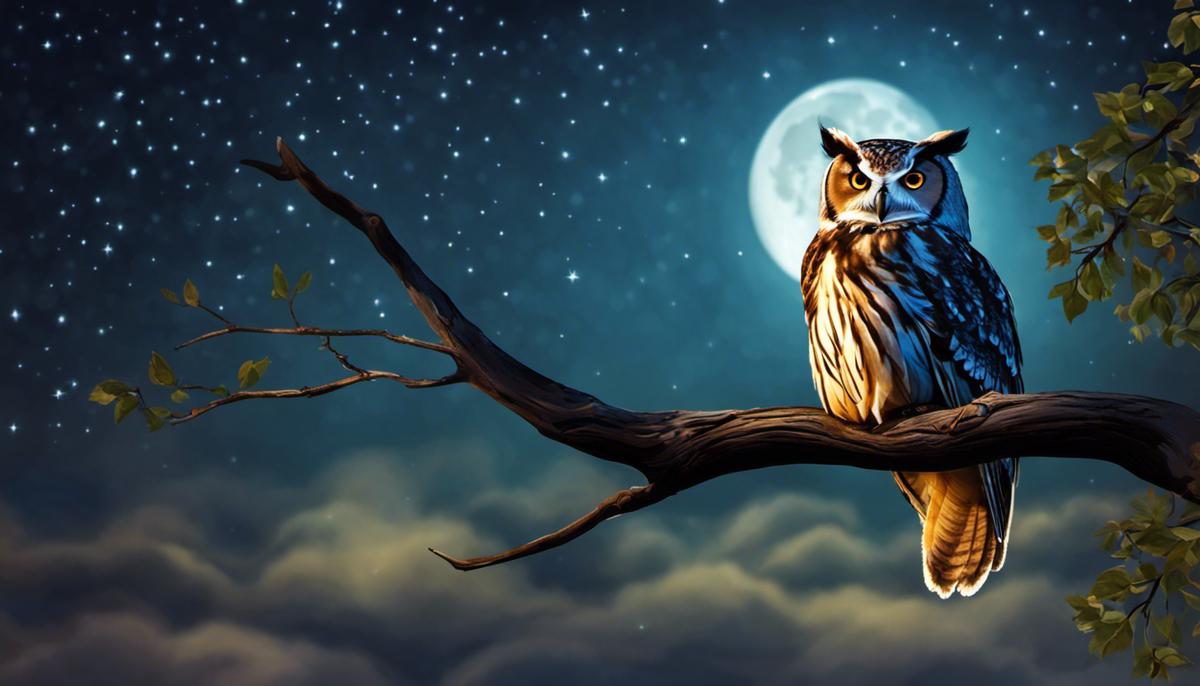
Intersect of Biblical and Psychological Meanings
Delving into uncovering more aspects of the fascinating subject of owls in dreams, we broaden the scope by exploring the interaction of biblical and psychological interpretations. This interdisciplinary perspective can yield unique insights, as the world of dream interpretation is an amalgamation of numerous facets, a melting pot, if you will, of numerous disciplines, concepts, theories, and beliefs, all of which contribute to the understanding of the universe within our minds.
As established, the owl holds an intriguing place in biblical texts, often implying desolation and darkness. Yet, this is hardly the end of the tale. Modern psychology, especially when viewed through the lens of Sigmund Freud and Carl Jung, provides a contrasting, sometimes complementary, interpretation of the owl in the dream realm. Jung, notorious for his archetype theory, might categorize the owl as a symbol of “The Shadow,” the element of the subconscious mind that comprises aspects individuals prefer to conceal. Freud, on the other hand, with his libido-focused theories, might well interpret the owl in dreams as a symbol of repressed desires.
However, the fascinating journey does not stop here. Even within Freud and Jung’s frameworks, the interpretations are not one-dimensional. The owl can just as well be seen as a beacon for introspection, a nudge towards exploring the hidden nooks and crannies of the self, or as a representation of the desire for liberation from inner turmoil. This wider psychological view begins to introduce a depth and complexity to the presence of the owl in dreams, extending beyond the binary of simple biblical connotations.
Additionally, the cognitive psychology perspective suggests that dreams are not divorced from lived experiences or knowledge. Hence, the appearance of an owl in a dream could signify an interplay between recently acquired information or experiences and the individual’s subconscious mind. Consequently, instead of viewing the owl solely as a non-kosher symbol associated with desolation, or merely as a symbol of wisdom and prophecy, the cognitive approach prompts us to consider owls primarily as a conduit for deeper understandings of oneself.
The rich tapestry of interpretations associated with owls in dreams underscores the complexities encircling dream symbolism and interpretation. At the intersections of various philosophical, cultural, religious, and psychological viewpoints, the owl’s presence in dreams is far from arbitrary. Instead, it offers avenues for profound introspection and self-discovery, serving as a symbol of the myriad-underexplored secret within ourselves.
In conclusion, it’s imperative to recognize the multi-dimensionality of the owl in dreams, far transcending simplistic biblical or psychological interpretations. Whether seen from the vigilance and wisdom angle, the biblical associations with ruin and darkness, Freudian repressed desires, Jung’s shadow concept, or the cognitive dream analysis approach, owls are undeniably intricate symbols with the potential to reflect deep aspects of the human subconscious. To fully appreciate the presence of an owl in a dream, one must be open to dissecting multiple layers of meanings and interpretations, thus paving the way for an enriching journey of self-realization and introspection.
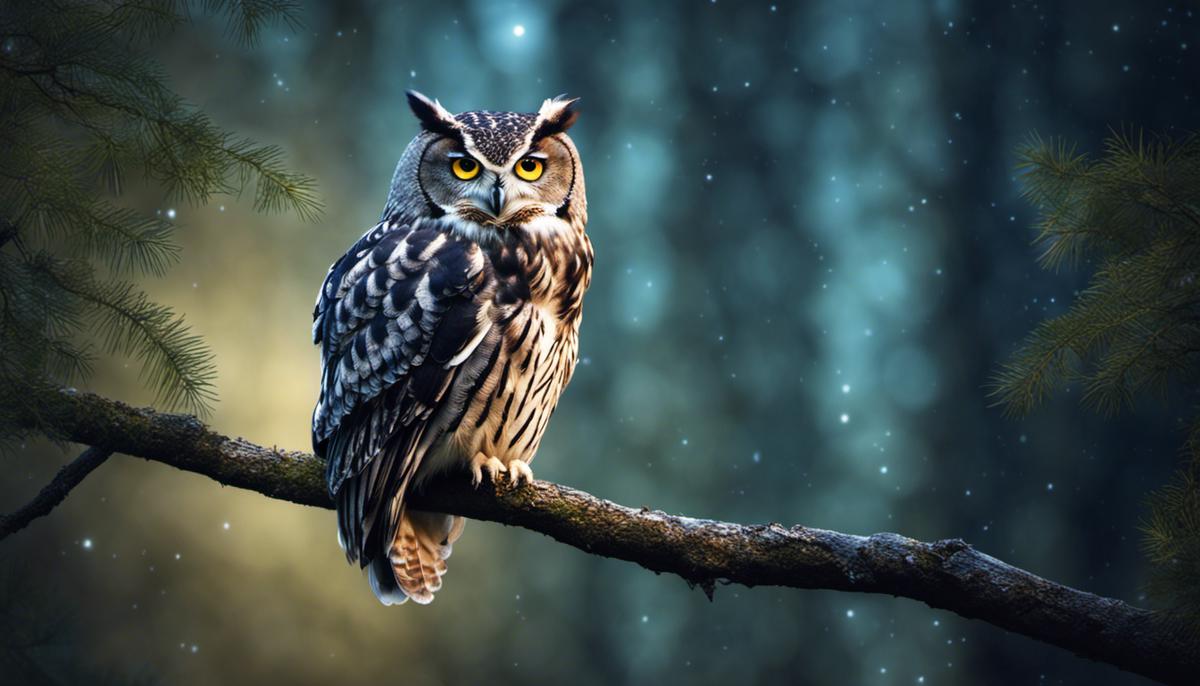
Case Studies and Personal Experiences
Captivating Personal Experiences and Documented Cases Illustrating Meaning of Owls in Dreams
The discipline of dream interpretation, while rich in centuries-old conjecture, is equally enriched by the abundance of personal anecdotes and recorded cases. These often provide practical, tangible insights into the meaning of particular dream elements, including the universally intriguing, nocturnal presence of owls. Case studies allow for observation and analysis from a definitive, personal lens – not unlike the rigorous objectivity of an owl’s unyielding gaze.
Renowned dream analyst Jane Teresa Anderson recounts an intriguing case of a client dreaming of an owl perching on her shoulder, a symbol she associated with wisdom and protection. The client was transitioning into a new life phase which required discernment and courage- qualities reinforced by the owl in her dream.
Similar personal accounts have been relayed throughout social networks and academic platforms. A recurrent dream of a woman saving an owl trapped in a well became a source of inner strength and determination for her as she navigated a turbulent period in her professional career. This theme resonates with the Owl Medicine in Native-American beliefs, where the owl is perceived as a beneficial spirit guide, its wisdom needed at critical life junctures.
Moreover, an exploration of the DreamBank, a database amassing over 20,000 digitized dream reports, also reveals intriguing patterns. Dreams involving owls tended to coincide with intense periods of transition, contemplation, or exposure to deep-seated truths for the dreamers. In several entries, owls embodied forthcoming wisdom, a call to introspection, or a harbinger of significant change.
While personal accounts significantly enhance the understanding of owls in dreams, recorded psychiatric cases further deepen the implications of this prominent bird of the night. A documented case in the Journal of Analytical Psychology details a patient who repeatedly dreamed of owls as he grasped the reality of his weakening mother’s mortality. In this poignant instance, the owl embodied an unnerving shadow of death, according intimate the patient’s underlying anxieties about the impending loss.
Another case chronicle found in the American Journal of Psychotherapy reports a patient dreaming of a silent owl appearing whenever she confronted painful past experiences. In this therapeutic context, the owl functioned as both a tool for uncovering repressed emotions and a symbol of her sought-after serenity and acceptance.
In conclusion, a myriad of unique personal experiences and meticulously recorded cases incredibly enlighten our understanding of the meaning and significance of owls in dreams. Beyond the interpretations rendered by tradition and psychological constructs, these insights grant us the privilege to appreciate nuance, celebrate individual perspective, and acknowledge how each encounter with this mystifying, nocturnal creature profoundly heightens our journey toward self-awareness, personal growth, and introspection. It is yet another testament to the transformative power of our dream world and the enigmatic figures that inhabit it.
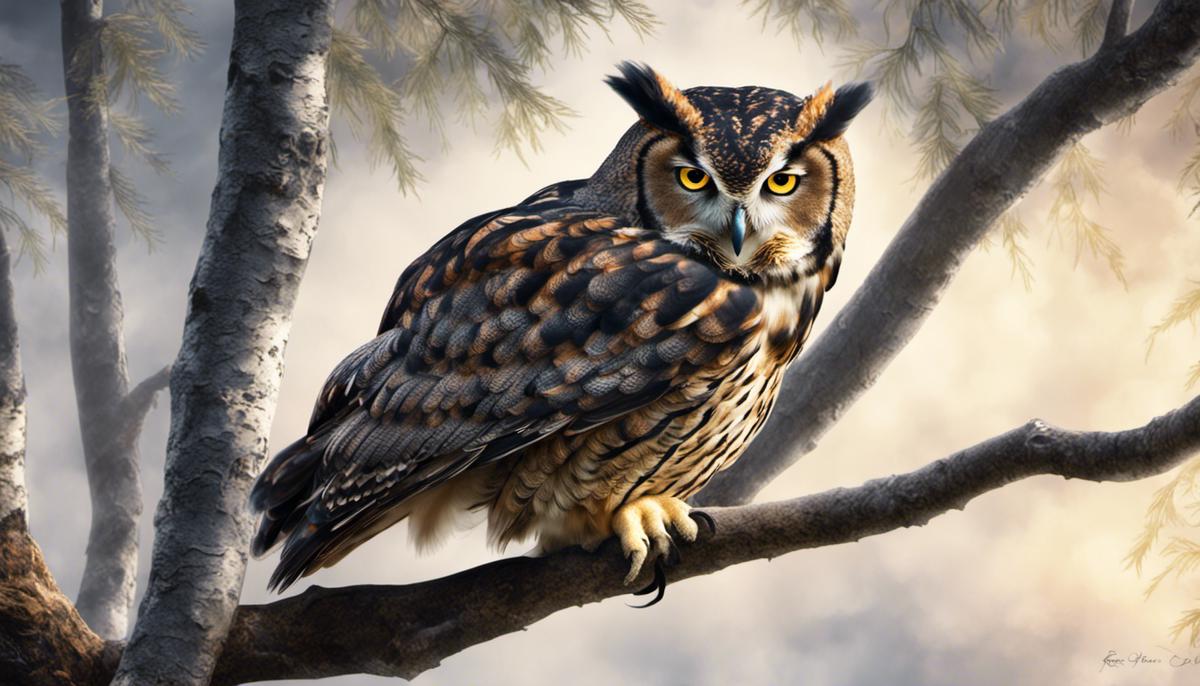
The intriguingly diverse interpretations of owls in dreams, drawn from both Biblical and psychological perspectives, reveal how a single symbol can possess manifold meanings. Whether as a harbingers of change, purveyors of wisdom, or omens of death, the enigmatic owl continues to shape the landscape of our dreams and the interpretation thereof. Personal experiences and case studies amplify this understanding, reflecting the collective human psyche’s interaction with this nocturnal bird. Indeed, understanding the symbology of owls in dreams is a journey that illuminates the hidden corridors of our mind, faith, and the mysteries of life itself.

